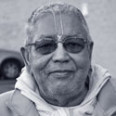Śrīla Bhakti Sundar Govinda Dev-Goswāmī Mahārāj explains the necessity of performing Śrī Hari-nām-saṅkīrtan at all social functions.
It is necessary to know why we perform particular functions. We perform functions for the satisfaction of our minds. Indians have one type of customs, Westerners have another type of customs, and Muslims have another type of customs. Everyone follows their respective customs. All types of customs have some rules and regulations and create an auspicious connection. But all functions become super auspicious whenever the Hare Kṛṣṇa mahāmantra is chanted. This is stated in Śrī Hari-bhakti-vilāsa, which is our topmost regulating guide for all functions. There lastly, one mantram is given:
yadāsaṅga kriyā karma jānatā vāpy ajānatā
pūrṇaṁ bhavatu tat sarvaṁ śrī-harer nāma-kīrtanāt
“I do not know how perfectly I have performed this fire sacrifice or this function, that is, it is not possible to perfectly perform any function. So, I pray that whatever deficiency is present here will be fulfilled through Nāma-saṅkīrtan, the chanting of the Hare Kṛṣṇa mahāmantra. Now I will chant Hare Kṛṣṇa.” This is the last mantram in every function and sacrifice.
You will see also everywhere that whenever people install something, be it a demigod or something new, or they enter a new house, they always bring a Nārāyaṇ-śilā for the function. Nārāyaṇ is the Supreme Personality of Godhead. So, we shall worship Nārāyaṇ. Why should we go to this side and that side? It is not necessary. If anyone wants to worship Durgā Devī, the Deity must be installed, but when Durgā is to be installed, then it is necessary to bring a Nārāyaṇ-śilā. Otherwise, the installation is not possible. Why? If we have realisation, then we will understand that Nārāyaṇ is the prāṇa, the life, of everything, so we have to bring the Nārāyaṇ-śilā there and worship Him.
We will realise the matter in this way, but for the satisfaction of people in general and to follow the established customs, we will do what is needed in different circumstances. We will not break the customs. But if we ignore them, we have no problem actually according the laws of dharma.
For example, when a male śūdra dies, his śrāddha should be held after one month. This is the rule. But if that śūdra took initiation from a Vaiṣṇava, then what should be our consideration for him? That is a question, and the answer is that the rule for the day that a brāhmaṇ’s śrāddha should be held is followed. But if we do not follow this, there is no problem. That very day, or the next day, or two or three days later, as is necessary for making preparations, we can make an offering to the Deities, do Vaiṣṇava-sevā, and make an offering to that departed soul. Generally in India for anyone from any caste who is a Vaiṣṇava, we are offer a śrāddha ceremony on the 11th day following the day of passing. But if you not do a śrāddha, no problem will come to you. The example in this regard is what Śrīman Mahāprabhu did for Haridās Ṭhākur: He made a festival the very same day.
When Śrīla Haridās Ṭhākur departed, what did Mahāprabhu do? He did not make a śrāddha ceremony or anything like that. He made a festival the same day Haridās Ṭhākur departed. So, you can also do that if possible. It is not harmful. Actually, it is good. Hari-nām-saṅkīrtan is the best thing, and it is not necessary to do anything else except Vaiṣṇava-sevā. This was shown by Mahāprabhu. He chanted and danced with the body of Haridās Ṭhākur. Then He washed the body according to some of the brāhmaṇ’s rules and put the body in samādhi because Haridās Ṭhākur was a siddha-mahāpuruṣ [great realised soul]. Afterwards, He came to the Jagannāth Temple and begged from everyone,
haridāsa-ṭhākurera mahotsavera tare
prasāda māgiye bhikṣā deha’ ta’ āmāre
(Śrī Chaitanya-charitāmṛta: Antya-līlā, 11.74)
“Today, Haridās Ṭhākur has gone. Please give me something for Vaiṣṇava-sevā.”
Everyone respected Mahāprabhu as God, so they tried to give all their Jagannāth mahāprasādam to Mahāprabhu, but Mahāprabhu did not take all of it. He took a small portion of all the varieties of prasādam, and still this was a very huge amount. Thousands of people then took that mahāprasādam as Mahāprabhu Himself distributed it. When all the mahāprasādam was distributed to the Vaiṣṇavas, everyone was satisfied. Then, after taking prasādam Himself, Mahāprabhu took some rest,
harṣa-viṣāde prabhu viśrāma karilā
(Śrī Chaitanya-charitāmṛta: Antya-Līlā, 11.100)
[“With both joy and sorrow, the Lord rested.”]
But lastly, Mahāprabhu gave a boon to everyone,
ye ihā̐ nṛtya kaila, ye kaila kīrtana
(Śrī Chaitanya-charitāmṛta: Antya-līlā, 11.91–93)
“Anyone who has seen this holy function, danced here, or chanted here, will certainly get Kṛṣṇa. Anyone who took prasādam at this holy function will also certainly get devotion to Kṛṣṇa. This is the mercy, the great influence, of Haridās Ṭhākur, and it is My boon to you all.”
Source
Spoken 7 June 1992.
